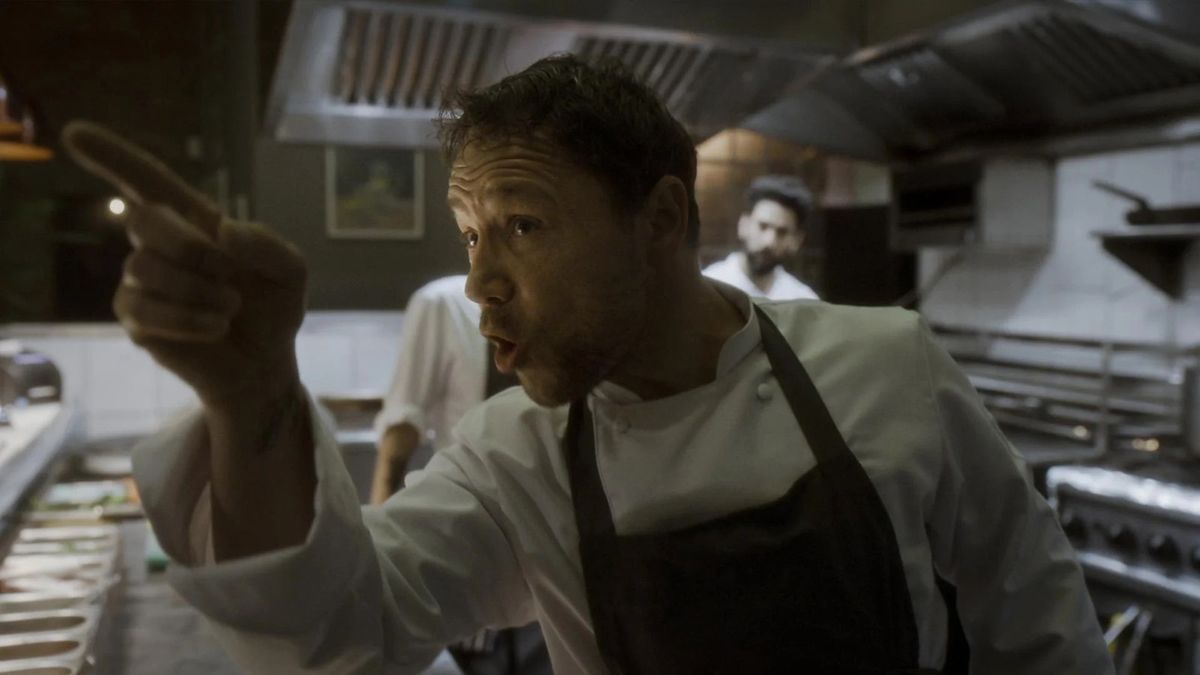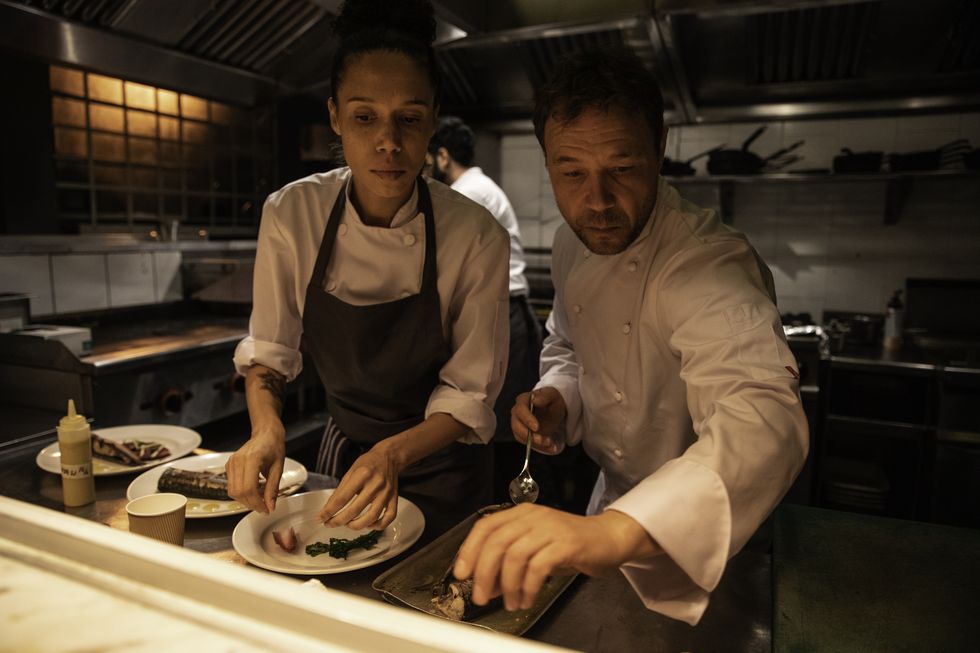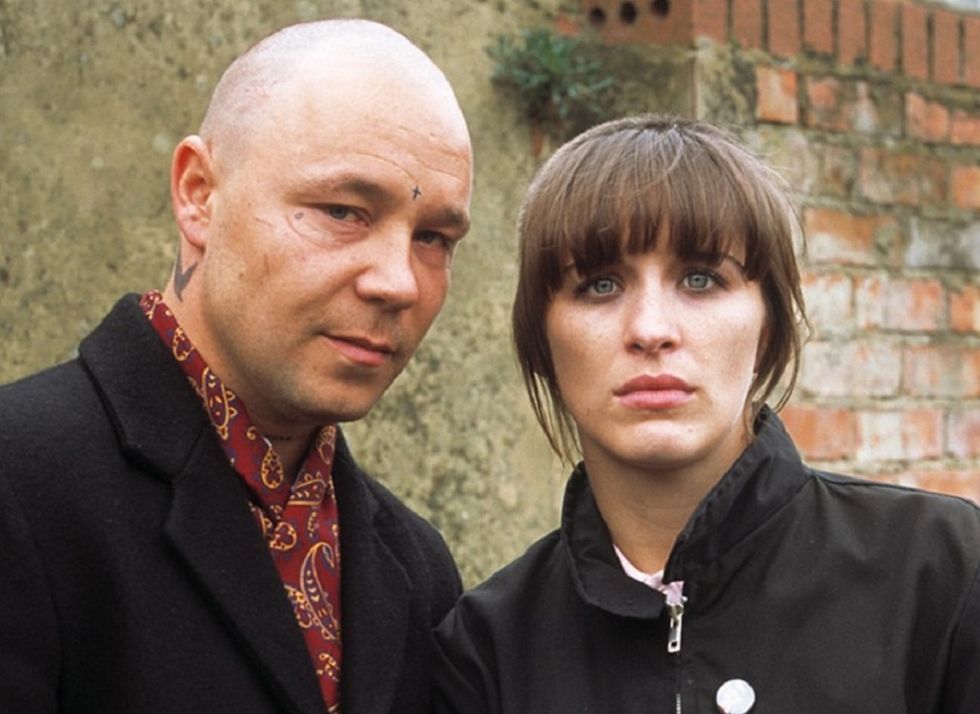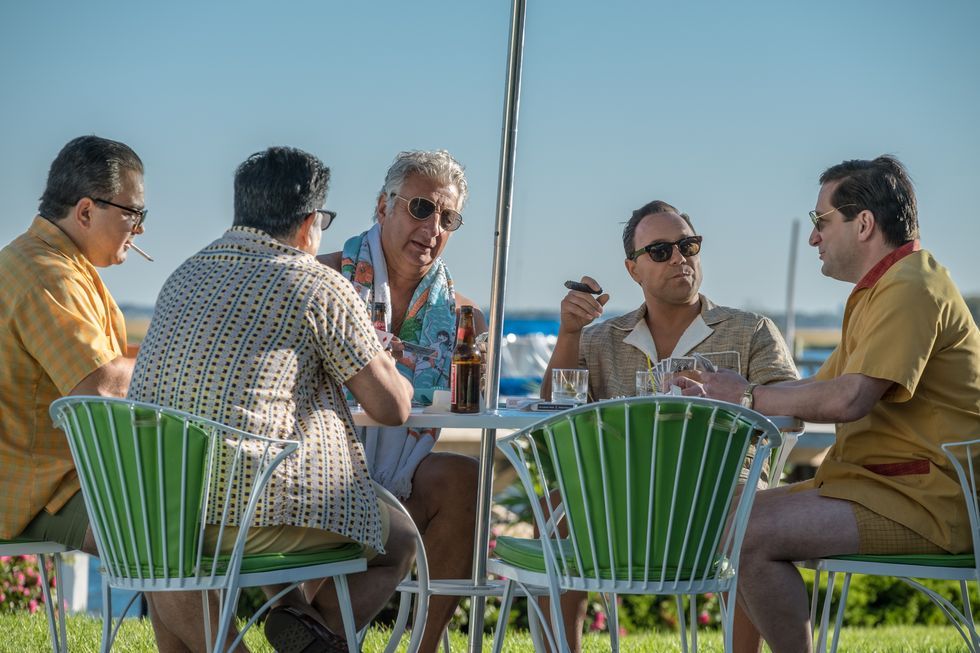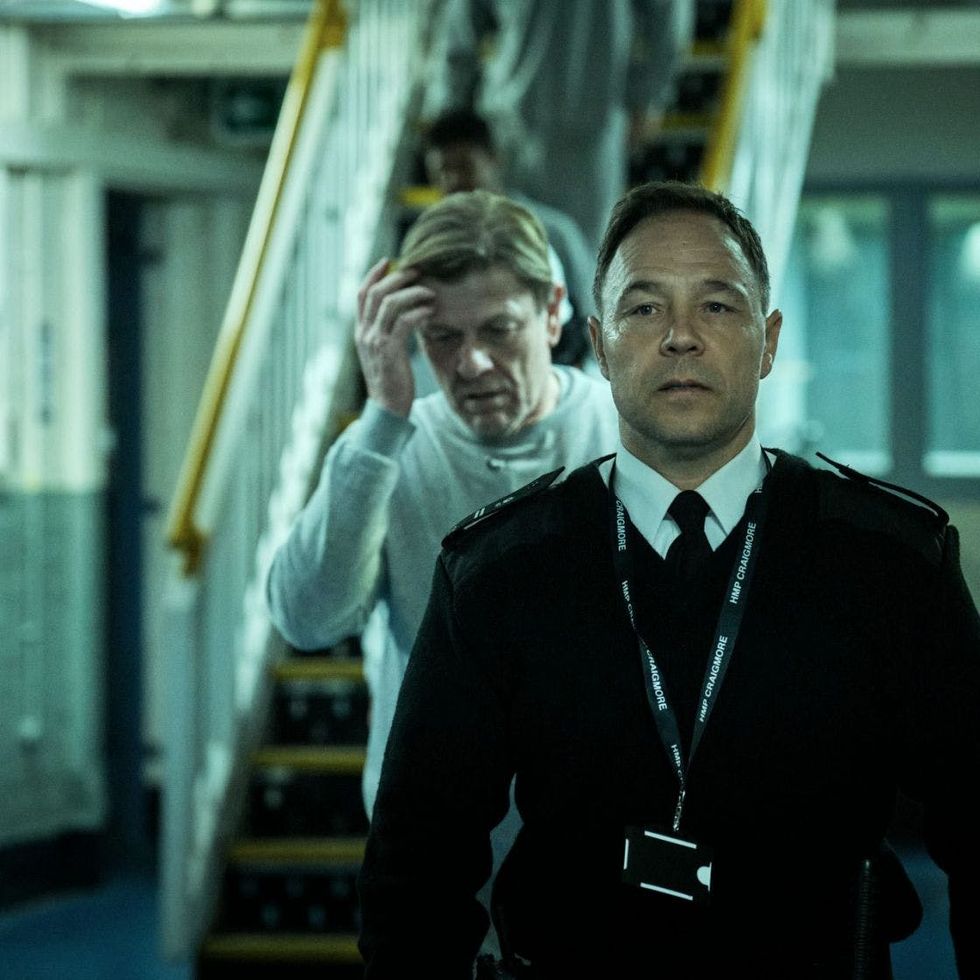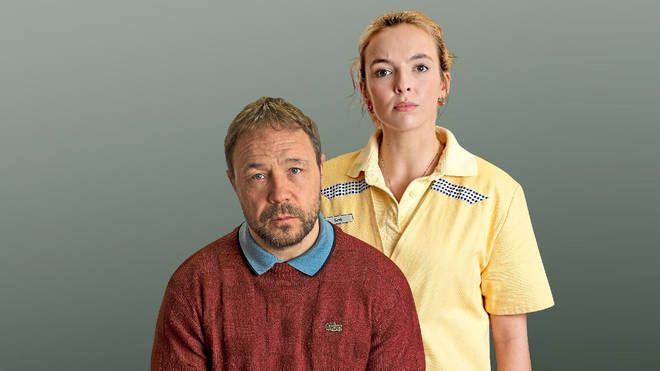In his new movie Boiling Point, Stephen Graham plays unravelling head chef Andy Jones.
We meet Graham’s character arriving for work late, watch him field calls from his collapsing personal life, get berated by a food inspector, deal with errant staff, difficult customers and old rivals, all the while swigging something stronger than water from his water bottle and disappearing into the back office for the occasional narcotic livener. No chef.
Based on Graham's 2019 22-minute short of the same name, Boiling Point was the idea of Graham’s old Band of Brothers colleague Philip Barantini, who quit acting to become a chef, working in some of the world’s most famous, and most famously high-pressure, kitchens.
Much of the dialogue is improvised, the cast chosen to represent the diversity you’d find in a London restaurant kitchen – only the front of house is well-spoken, well-to-do and white – the idea being that Boiling Point goes someway to showing us what one evening in one kitchen in one London restaurant might be like. (It was filmed in a real one, Jones and Sons, in Hackney. A real Andy Jones runs that place, a calm and sober individual with no relation to his imploding fictional counterpart.)
As well as being excellent, Boiling Point is also the first British single-take film – a continuous 90-minute heart attack, shot the day before Lockdown 1 came into force in March 2020.
Ah, you might say, what about Sam Mendes and Roger Deakins' 10-times Oscar-nominated war epic 1917 from 2019?
But as Universal Pictures was happy to point out at the time, releasing its own 'making of' featurette, that film was a series of very long takes, stitched together – it fades to black around the 60-minute mark, a giveaway – it's ‘one-take’ reputation largely a media confection.
Assuming you discount movies without a plot (or, indeed, humans), like Andy Warhol setting his camera up opposite the Empire State Building and keeping it rolling for eight hours for 1964's Empire, one-take moves are extremely hard to pull off.
Even extended ‘one-take’ scenes like the amazing car ambush scene in 2006's Children of Men was a clever trick, and used cuts.
The most famous genuine one-take movie with a cast is the experimental 2002 movie Russian Ark – one 96-minute Steadicam shot, involving over 2,000 actors and three orchestras. But that film is, of course, Russian.
(Though even this… even this… had stuff digitally sped up and slowed down in post-production, camera cables edited out, snow and weather added in, etc.)
Therefore, we’re saying with some confidence that Boiling Point represents the first actual, genuine, real British one-take movie.
It’s also the debut from Matriarch Productions, a company Graham formed in January 2020, with his wife, the actress and producer Hannah Walters.
It caps a stellar 12 months for Graham, one that includes prison drama Time, by Jimmy McGovern, in which he played a compromised prison guard opposite Sean Bean’s out of his depth prisoner, and Help, his Covid-19 care home drama, in which he played a patient with young-onset Alzheimer’s disease, opposite Jodie Comer's carer – surely up there with some of the best British TV ever.
Graham spoke to Esquire about Boiling Point, mental health and Buddhism, as well as his drive to tell “stories that need to be told”.
Not only was Boiling Point shot in one-take, but the clock was ticking on getting it done, is that right?
We had such a short period of time to shoot it. That day before [the March 2020] lockdown when [Boris Johnson] said ‘Get in your doors, put the bolts and we’ll see youse whenever’. That was literally our last day of filming. We’d created a script as a skeleton to riff and improvise around. Then we had a full day rehearsal [in the restaurant]. And then we had basically a dress rehearsal. And then the next day we came in and it was, like, ‘He’s shutting us down tomorrow. This is the last day we can do it’. Everyone’s absolutely shitting themselves. Because you don’t want to be the one who gets it wrong.
Presumably someone can drop the ball in the 86th minute and the whole thing’s ruined?
Yeah. And that could have happened. But what happens [with a project like this] is you’re so in it, you’re so engrossed in what’s happening that you lose track of all that. It’s the most fucking… excuse my language. I don’t want to sound pretentious but it’s the most Zen way of filming I’ve ever come across.
Because it’s as ‘real’ as acting can be?
It’s so real. Because there’s nothing else you can be but in that moment. You don’t have time to be, like, ‘Okay, let me get ready for this’. And surely that’s the definition of acting? It’s about listening, and reacting but ultimately it’s about being in the moment. And that’s the beautiful Buddhist philosophy of life as well. And it’s tangible. You go into a different state.
What was it like the moment you knew you’d pulled it off?
It’s the closest I’ll ever come to feeling like a footballer winning the Champions League. The whole room went ballistic. Everyone was jumping up and hugging everyone. It was such a wonderful experience.
Your character, Andy Jones, has a lot on his plate
In [the restaurant] industry you have to work really hard, unless you’re one of these elite chefs and it’s your name above the door. So, it’s that workload. And that workload can be detrimental to family life. It’s the male ego as well – ‘Look, I’m the man, doing the work’. That kind of mentality. And with the pressures that come with that we can take out eye off the ball of what’s really important, do you know what I mean? And then if you mix that with, in Andy’s case, his addictions – to alcohol and narcotics – it is a boiling pot waiting to explode.
He’s sleeping in the restaurant’s back office. There’s a nice exchange where one of his staff has worked this out, and says it would have been okay to ask her for help
We wanted to get that across. Because a lot of us, in real life, can be great at listening and giving advice but we don’t take our own advice. And for me it’s the bravest thing that some can do, to ask for help. I really do. With whatever that may be. ‘I’m not coping here. I need a bit of help’.
Improvisation is your happy place, isn’t it? What’s the appeal? The challenge? The fear?
It’s both. Where I really understood the process and how it can help a script was with Shane [Meadows, who directed Graham in his breakout role as the volatile nationalist Combo in 2006’s The Is England]. I always thought I had an idea of acting and I was okay at it. But when I worked with Shane that’s when I really understood the process of what it was about. And how to go to those depths to create a character.
One phenomenal, heart-breaking scene sticks in the mind. When Combo confesses his love for Vicky McClure’s Lol by presenting her with a box he’s made from matchsticks
Again, this is the brilliance of Shane. When we were talking about that in the rehearsal process and he was, like, ‘You need to give her something’. I had an uncle who was in prison and I remember a ship on the mantlepiece, made out of matchsticks. And that’s what [the prisoners] used to do. They’d make stuff out of matchsticks and send them off. I said to Shane ‘Can you imagine the amount of time and effort and love that’s gone into this?’ You don’t get to see or talk to [your loved ones] so you’re making this thing out of matchsticks. And he went with it, and two days before we come to shoot the scene the wonderful props people go ‘This is what we’ve made’. So it’s about being allowed to be part of the creative process.
Martin Scorsese, who you worked with on The Irishman, works in a similar way, right? There’s a structure. But also leeway to take a scene somewhere else
They both give you the confidence and the belief, not in your ability, but the fact that you’ve found the character, and that everything you say is coming from a truthful, organic place for that character. So you don’t feel, like, ‘Shit, I can get this wrong’. And there was that scene I was lucky enough to do with Robert DeNiro…
When your character, Anthony 'Tony Pro' Provenzano, is squabbling with Al Pacino’s Jimmy Hoffa about how long he’d be prepared to wait for someone who was late for a meeting. Hoffa says ten minutes. Tony says 15. Then Robert De Niro gets involved, saying “12 and a half…”
Yeah! See that line, I’ll share this with you, it was meant to be a scene with just me and Al Pacino, doing all the talking. And then I look around and I see Robert De Niro [Frank “The Irishman” Sheeran] and in my head I’m, like, ‘Shit! I’m in a scene with Robert De Niro and I don’t even get to say anything? All I can do is have a look?’ So I went over to Marty [Martin Scorsese] and he said ‘Free it up. Don’t tell them what you’re going to do. Go and play with it’. And he was saying ‘fifteen’ and I was saying ‘ten’ and then as the character it just felt correct to [turn to De Niro and ask] ‘What do you think?’ He just looked round at me and did that classic De Niro [does the De Niro face] and went ‘Maybe 12 and a half?’ And he laughed and then we laughed. And then we go for each other [an unseemly fight ensues]. Marty goes ‘cut!’ and the two of them [De Niro and Pacino] were, like, ‘It [ie: the scene] came alive!’ Robert De Niro looking at me and saying ‘It came alive’… I couldn’t believe it. But everything in that little scene came from improvisation, of Marty saying ‘Go and play with it’. It went to another level.
Of course there’s plenty of directors and actors who insist on the script being played word-for-word
Oh, they shit themselves! As soon as you do something different, they go ‘What are you doing?’
They must love you
I don’t think there’s many actors that will turn up on set and go, ‘All right? See them two lines, there? I don’t think I need to say them. I think it’s better if she says it’. [Laughs] Which is what I just did in something I’m filming now. But then they director goes [suspiciously] ‘Let’s hear it’. And then you do it, and it’s, like, ‘Fucking hell! Yeah!’ Don’t get me wrong, the script is the Bible – that’s why we’re there. But if you can improvise in certain places it can elevate it a little.
With Boiling Point, Time and Help, you seem to be on a one-man mission to keep the school of on-screen social realism alive
We have to make sure we always provide a place for films like this. It’s become more and more difficult to find funding for British films. One of the first things that comes out of people’s mouths now is ‘Let's go to [streaming platforms]’. And [they] make some great stuff, don’t get me wrong. But [they] also makes some shite. There’s some stuff on there where I think ‘Who decided that should be made? Who was the person who sat in that room and went ‘Oh, that’s a great idea, let’s do that’'? Who threw money at that?
Are you thinking of something in particular?
Oh my God. Me, Hannah and the kids were looking for a film to watch, and it’s a nightmare in our house. One of them goes ‘I’ve seen this’. And I go ‘No, you haven’t seen it, it’s new’. And they go ‘I have, I’ve seen most of it on TikTok’. [Their son] Alfie had swerved us already, he was, like, ‘Nah, I’m not up for it’. So Alfie had done one, upstairs. So it’s me, Hannah, [daughter] Grace, who’s 16, [her friend] Caitlin, who’s 17, and I go ‘This could be alright’. It was called [names a recent made-for-streaming film] or something?
No good?
Shit. We turned it off after ten minutes. Me and Hannah turn to each other and go ‘That was atrocious’. And our Grace – our Grace, 16 years of age, studying Film Studies at A-Level – went ‘Who decided that should get made?’ Exactly! Who went ‘This will be great!’?
The content machine is a hungry beast
Yeah, I understand the need to get content out. God knows there might be days when I have to do one of those [films], to pay me bills. But someone have a little look at the script first and go ‘Nah, that’s not gonna work’.
You mentioned your daughter is doing film studies. You’d be okay if your kids followed you into the business?
I don’t know. I’m not sure. As long as they’re happy. They might do, they might not do.
But you haven’t put them off?
It’s hard graft and you need skin like a rhino. And there’ll be up days and there’ll be down days. But as long as I can give them what my mum and dad gave me, which was nothing but support and love and guidance then yeah – go out there and fly.
Time was particularly great. How did you approach that?
One of the first things I said to [writer] Jack Thorne was that I want it to be like a one-off drama, like a [pioneering 1970s BBC anthology] Play for Today. I basically want to make a film for the telly. Because if you look at it, that’s the same budget as a British independent film. So that was our intention. I wanted it to be a little bit of a [raps knuckles on table] knocking-on-your-door Alan Clarke piece. And to go back to what we were saying before, maybe that’s the way it kind of has to happen now, do you know what I mean? Maybe the television will provide more of a platform for that kind of “independent film” thing. Because the stories need to be told and the stories are there to be told. From diverse communities and working-class communities. There needs to be some kind of social commentary.
Is that what Matriarch Productions will concentrate on?
Yeah, it is. Look, predominantly we’re in the business of entertainment, don’t get me wrong. But I’m so grateful to be in this position where my stuff also has a bit of meaning. If I’m in the privileged position to be able to come into someone’s living room through, as Jack Thorne so beautifully puts it, the Empathy Box, hopefully you get something out of what I’m saying and what I’m a part of, through this medium. That’s an amazing thing to be part of.
Why ‘Matriarch’?
It’s loosely based on Hannah’s mum, my nanny and my Auntie Vera. I think that, you know, behind every good man there’s a stronger woman. And I love that concept of the mother hen – the woman who takes care of everyone. That’ll give everyone an opportunity. That’s the concept. No one loses out. We’re trying to put equality right across the board. ‘Don’t worry, I’ve got you. I’ll give you a chance’.
And how’s it going?
We’re doing alright! We are! We’re moving in the right direction. [Coyly] I can’t say in case things don’t come off, but we’re having some really interesting conversations. And it’s nice to be a grown-up, sitting at the table, do you know what I mean? I feel like I’ve earned me right to be there.
What response did you get from care workers and prison wardens, after Help and Time?
The amount of prison wardens that got in touch, and inmates as well – and people who’ve been to visit people in prison. I got this lovely message saying ‘Thank you for being part of something that shows how difficult it is for the people in prison’. She was going on about her son, who’s in prison, and how difficult it is for him, and what we did kind of really shined a light on that. And the amount of people who got in touch after Help was phenomenal. To be able to be part of something like that is amazing. All I ever wanted to do was make a living out of it, cos I love acting, and make enough money to raise a family, and go and do the job I love doing. I’ve wanted to be an actor since I first did a play at 10 years of age.
No other job?
It was either that or be a fireman.
What appealed about that?
I just thought it would be a really interesting job, do you know what I mean? Every day would be different! You’d never be bored. I’ve got a mate who’s a fireman.
Does he like it?
He loves it. Yeah. There was a moment when I was going to do that, as well. I went and had me tests, the academic tests and the psychological test, which I passed, and then I did the physical bit, and there was one final bit to go and meet the chief of that particular [fire station], but then I got an audition on the same day. And I chose the audition.
We touched on mental health earlier. You’ve spoken before about a wobble you had in your twenties. You’re teetotal now, and practise meditation. Is that right?
In my early Twenties, yeah. I think every young man goes through a moment. Meditating isn’t out of necessity. It’s just out of where I am now, where I’m comfortable… Being present, being mindful, enjoying this illusion [ie: life] as much as I can. I’m not a practising Buddhist but I love the philosophy… I love lots of different philosophies. I’m not religious per se.
What elements of Buddhism strike a chord?
Just the attitude to life, and the ecosystem. And also the Toltec Native American Indians [pre-Columbian people who inhabited Mexico from the 10th to the 13th centuries, noted for their alternative spirituality and pyramid building]. I love that kind of philosophy and ideology as well. They’re all connected and part of the same idea. Try and be present and enjoy these experiences as much as we can. We’re all on a path of consciousness and a journey of enlightenment. It just depends on what you choose to get out of it.
When you did Desert Island Discs in 2019, you talked about a suicide attempt in your Twenties. It seemed to come out of nowhere. Had you spoken about it before?
I hadn’t mentioned it, I hadn’t pre-empted it in any way, shape or form. It just came out.
I listened to it again before speaking to you. There’s a stunned silence
Yeah! It just hangs there, you know? It’s just someone being very honest and very vulnerable. And I felt okay to sit in that vulnerability, do you know what I mean? And put my truth across. A lot of people got in touch. It’s like we were saying at the beginning [of this conversation]. Letting people know that it’s okay to let ask for help. It’s always okay to reach out to someone.
In cinema there is, of course, another quite famous one-take scene set in a kitchen. In Goodfellas, by your mate Marty. Did that come to mind making Boiling Point?
It didn’t! But you’ve just made me think. I should try and get a copy of this over to him. I’m gonna go ‘Hey, Mart! What do you think of this?’ [The Goodfellas shot] was groundbreaking at the time, where you follow the camera from the outside going inside. But it’s quite short.
Boiling Point is in cinemas and digital platforms on 7 January
